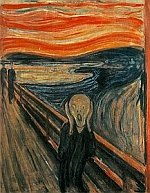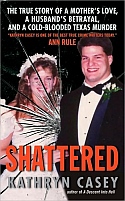TRUE CRIME
|
NON-FICTION
|
|

|
|
|

The Scream
Edvard Munch
The original German title given to the work by Munch was Der Schrei der
Natur (The Scream of Nature). The Norwegian word skrik is usually
translated as scream, but is cognate with the English shriek.
Occasionally, the painting has been called The Cry.
In a page in his diary headed Nice 22.01.1892, Munch described his
inspiration for the image thus:
“ I was walking along a path with two friends — the
sun was setting — suddenly the sky turned blood red — I paused, feeling
exhausted, and leaned on the fence — there was blood and tongues of
fire above the blue-black fjord and the city — my friends walked on,
and I stood there trembling with anxiety — and I sensed an infinite
scream passing through nature.
|
|
|
BOOK
ILLUMINATIONS
From Merrimon Book Reviews
|
|
Shattered

by Kathryn Casey

Disturbing
and unforgettable
In Katy, Texas,
football was king and David Temple was the king of kings.
Handsome and talented, David Temple had the world at his feet. He
married Belinda Lucas, a woman full of energy and charm. They had
a son and were awaiting the birth of their daughter. Theirs was a
fairy tale marriage, or so it seemed. Then one day, everything
changed. On January 11, 1999, Belinda's body was found in a
closet. Her face had been destroyed by a shotgun and the hope of
her daughter gone. From the beginning. only circumstantial
evidence seemed to tie David to the brutal murder. One determined
detective would pursue the case for eight years. One determined
prosecutor would pursue justice in the name of Belinda and her unborn
child. Far from the fairy tale veneer, the investigation would
uncover the nightmare that even David Temple's family could not hide --
a marriage filled with emotional abuse, adultery, and a shocking tale
of a man who would stop at nothing to get what he wanted.
In SHATTERED, Kathryn Casey examines the family backgrounds of David
and Belinda Temple through interviews with family and friends.
Details of evidence, the investigation and the trial comprise the
second half of the book. From the very beginning, the reader
assumes the guilt of David Temple as more and more examples build up
the portrait of the man behind the pretty picture. Bit by bit,
Kathryn Casey unveils the dynamics within the marriage as well as the
role David Temple's family might have had in creating the man he would
become. Although Kathryn Casey makes the case against David
Temple from the very beginning, she does not sensationalize the abuse
or crime details. In one brief moment at the police station, a
reader almost feels for the mother as she is faced with the horror of
the crime. Even though the author emphasizes the brutality of the
crime, she does not do so by resorting to the kind of minute graphic
detail often found in fictional stories. Indeed, this book haunts
precisely because of the author's restraint and ability to focus on
those scenes and images that make a reader feel outrage at the crime as
one sees Belinda as more than just a victim. The author's note at
the end is a must read. Here, Kathryn Casey's personal thoughts
pinpoint the most chilling aspect of the crime. In the most
simple everyday details, this reader finds the true horror of the
crime.
In a world full of violent news stories and sensationalistic
journalism, Kathryn Casey's writing has the power to haunt a reader's
thoughts long after the last page. Even weeks after finishing
SHATTERED, this reader cannot forget the book and the disturbing
portrait of this marriage. Whereas new headlines often come fast
and then are forgotten, SHATTERED, despite its somewhat simplistic if
not tacky cover, succeeds in making the story unforgettable.
SHATTERED is one of the best true crime novels I have read precisely
because of the author's ability to combine an easy, flowing style with
the artistic ability to pinpoint the most humanizing moments.
Publisher: Harper
True Crime
(March 9, 2010)
Reviewed by Merrimon,
Merrimon Book Reviews

|
|
|